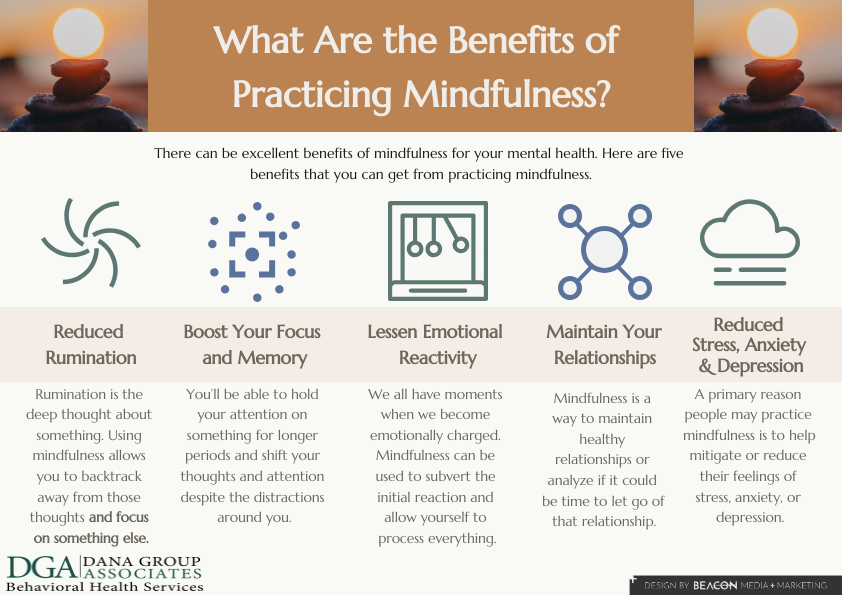Do your thoughts get the best of you? Do you find yourself getting into cycles of thinking the same negative thoughts? Many people have negative intruding thoughts that can impact the state of their mental health.
These thoughts can increase feelings of anxiety, stress, or depression. Finding a way to mitigate these intrusive thoughts can reduce these feelings and benefit your overall well-being.
If you’re struggling to find ways to help manage how your thoughts affect you, mindfulness could be the answer for you. Here are five benefits of mindfulness for your mental health and how to practice mindfulness in your daily life.
Are you interested in getting guidance to practice mindfulness? Contact Dana Behavioral Health today to learn more!
What Is Mindfulness?
Mindfulness is the exercise of paying attention to present moment experiences that can ground you. This includes using techniques such as meditation, breathing, or yoga. You can focus on the smaller things happening around you, like focusing on the texture of the chair you’re sitting on, so your thoughts don’t become overwhelming.
Mindfulness training can help you become more aware of your thoughts, feelings, and body sensations so you’re not overwhelmed by the feelings and thoughts you’re experiencing. Practicing this method can help you recognize when you’re having negative thoughts and allow you to find a way to let go of the thoughts.
This method of self-regulation stems from Buddhist practices of being aware of yourself and what is happening around you. However, you don’t need to be religious or spiritual to practice it. Many therapists have implemented this method in ways of helping their clients with anxiety, stress, PTSD, or depression.
Mindfulness isn’t a way of pushing your thoughts and feelings aside. It’s a way of recognizing their presence but having the ability to let them go healthily.

What Are the Benefits of Practicing Mindfulness?
Practicing and implementing mindfulness into your life can help reduce overwhelming feelings of stress, anxiety, or depression. There can be excellent benefits of mindfulness for your mental health. Here are five benefits that you can get from practicing mindfulness.
1. Reduced Rumination
Rumination is the deep thought about something. Many people experience this when they have negative intrusive thoughts about themselves. These thoughts can feel overwhelming, and you may believe that they’re true when they’re not.
Using mindfulness allows you to backtrack away from those thoughts and focus on something else. You’ll reduce rumination by allowing yourself to think about the sounds, sights, or feelings that surround you. It allows you to recognize that you’re having intrusive thoughts about negative experiences or feelings and find a way “out of your head.”
You can focus on your breathing instead of your thoughts, which makes you feel less tense. Once you’ve found a way to let go of the negative thoughts or feelings, you can return to focusing on something else. You can use your hobbies to reground yourself and have positive feelings.
Do you want help reducing rumination? Schedule an appointment with Dana Behavioral Health today to receive support!
2. Boost Your Focus and Memory
Mindfulness has shown signs of helping people boost their focus and memory. You’ll be able to hold your attention on something for longer periods and shift your thoughts and attention despite the distractions around you.
Since you practice refocusing yourself on different thoughts and tasks, it allows you to regain focus on something. You’ll be able to use this on daily tasks such as housework or hobbies. There may even be a difference that you notice in your work life.
Mindfulness can also boost your memory as it works in the same part of your brain. Many moments throughout our day require us to remember something for a later time, or you’d like to remember important moments forever. Mindfulness can help improve short-term memory and help retain the things you want to remember.
3. Lessen Emotional Reactivity
By practicing mindfulness, you’re allowing yourself to acknowledge that your feelings are there without letting them get rooted into your brain. Recognizing possible emotional triggers and learning how to cope with them can reduce your emotional reactivity.
We all have moments when we become emotionally charged due to external circumstances. Mindfulness can be used to subvert the initial reaction and allow yourself to process everything.
Lessening these reactions can help maintain your relationships by not reacting to a situation in a way that you might regret later. You can take the time to understand a situation and fully assess how to move forward.
4. Maintain Your Relationships
A great benefit of practicing mindfulness is maintaining your relationships with people. As stated previously, in times of stressful situations with someone, you’ll be able to lessen your initial emotional reactivity. In other words, you can stop yourself from saying possibly negative things to someone that you may regret later and hurt your relationship with that person.
Mindfulness is a method of self-reflection that can allow you to analyze the relationships you have with someone. This can be used to look at a romantic relationship by seeing if things are going in the direction you want them to and if the parties are feeling happy and loved.
You can also use this method to look at friendships or family relationships. Reflecting on these relationships can help you see if a person is being good to you and if you’re a good person to them. Mindfulness is a way to maintain healthy relationships or analyze if it could be time to let go of that relationship.
5. Reduced Feelings of Stress, Anxiety, and Depression
A primary reason people may practice mindfulness is to help mitigate or reduce their feelings of stress, anxiety, or depression. People can recognize when these feelings are starting to negatively impact them and learn to let go of the emotions.
Focusing on other things around you can reduce the anxiety that you might feel due to your thoughts. When you focus on something else, you may notice that it allows you to release the tenseness you may feel in your body.
Mindfulness allows you to acknowledge your feelings but find a way to move past them. Sometimes people find that focusing on the smaller things, such as the sights and scents around them, allows them to reframe the thoughts that they’re having. It’s not a way of minimizing what you’re feeling but rather reframing the impact that the thoughts and feelings are allowed to have on your life.
How to Practice Mindfulness
There are a few ways to practice mindfulness through professional help and daily life. If you see a therapist, they may help guide you through the process, or you can learn the methods by yourself. Some structures of mindfulness programs include:
- Mindfulness-based cognitive therapy (MBCT) combines mindfulness with cognitive-behavioral therapy (CBT) to break negative thoughts in people with recurring depression.
- Mindfulness-based stress reduction (MBSR) uses meditation and yoga to help you deal with stress, depression, anxiety, and pain.
You can practice mindfulness in your daily life without professional guidance. Some practices that you can implement into your life can include:
- Noticing everyday things like the air moving around you or the taste and textures of the foods you eat.
- Picking a regular time to practice mindfulness, such as your morning commute or evening walk.
- Trying something new makes you notice things differently, even as small as changing where you normally sit.
- Recognizing your thoughts when you’re sitting quietly for a few moments by noticing that they’re there, observing them, and letting them go instead of engaging with them.
Why Should You Get Help Practicing Mindfulness?
Although you can implement mindfulness into your daily life, it can be not easy to do it by yourself. Since everyone is different, practicing it in your everyday life will be different. It can also be different depending on if you’re suffering from recurring stress, anxiety, depression, or PTSD.
Even people who suffer from panic attacks can use mindfulness to notice the oncoming signs and reduce the stress, anxiety, and overwhelming feelings by focusing their mind on the textures they can feel or even counting something in a room. It can be an excellent way to practice stopping panic attacks and prevent them in the future.
Getting help from a professional therapist can help you understand how to properly implement mindfulness in your life, depending on what you may be going through. It also needs to be recognized that since mindfulness is a method of self-reflection, it can sometimes increase one’s feelings of anxiety if they’re unprepared to implement mindfulness into their life.
Seeking help from a therapist can help you prepare for these possible feelings and allow you to get help coping with them.
At Dana Behavioral Health, we have trained therapists that can help you recognize when mindfulness is right for you and help you learn how to practice it. We can help you improve your mental health and benefit from the practice of mindfulness.
Are you ready to start your mindfulness journey? Schedule an appointment with us today to get help!
